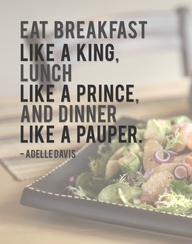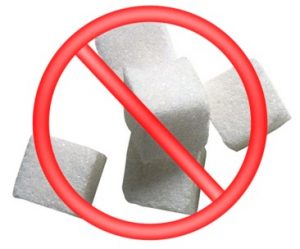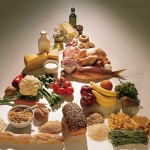Healthy diet: 10 keys for 2017
Losing weight is one of the good intentions we usually start the year with, either because of the excess of Christmas meals or because it has long been an objective. And what better time than the month of January to start with a healthy diet? In this first post of 2017 are exposed ten dilemmas we often encounter when starting a diet to lose weight, for which I had the valuable collaboration of Lilly Rikhter, Russian athlete champion in various sporting modalities as well as, among other achievements, bearer of the Olympic torch in Sochi 2014; she is currently an expert in fitness.
1) «Diet»: temporary torture or permanent way of life?
The first dilemma which we usually find when starting a diet is about the duration of it. The term «diet» traditionally implies something temporary and full of restrictions, which is accentuated by commercial diets that promise quick results in a short term, «miracle diets» based basically on fasting or «low-carb», both unhealthy strategies that often have a rebound effect. That is why we should understand the term «diet» as a form of long-term diet and not as a diet fot a limited time.
Lilly Rikhter: «I do not like the term diet. Either we eat well or we do not. Healthy eating should be something permanent, a way of life. Any temporary change in eating habits causes stress for our body and that is very harmful.»
2) Eat breakfast like a king, lunch like a prince and dinner like a pauper?
 If we are guided by the caloric value of the meals, nutritionists usually recommend us: breakfast 20-25%, lunch 35-40% and dinner 25-30% (in% of the daily caloric value); this may vary slightly according to the addition of a 4th and 5th meal. Note that there is no regressive intake (= from more to less) as in the popular saying of the king, the prince and the beggar. Seen in this way, the key would not be in the quantity, but in the composition of the meals; hence the conclusion of an earlier post: «No king, no pauper, but selective prince«. And in Russia there is also this saying?
If we are guided by the caloric value of the meals, nutritionists usually recommend us: breakfast 20-25%, lunch 35-40% and dinner 25-30% (in% of the daily caloric value); this may vary slightly according to the addition of a 4th and 5th meal. Note that there is no regressive intake (= from more to less) as in the popular saying of the king, the prince and the beggar. Seen in this way, the key would not be in the quantity, but in the composition of the meals; hence the conclusion of an earlier post: «No king, no pauper, but selective prince«. And in Russia there is also this saying?
Lilly Rikther: «Yes, in Russia we have a very similar popular myth: «Eat breakfast alone, share your lunch with friends and give your dinner to the enemies». The meaning of the saying comes to be the same as that of the king, the prince and the pauper, to eat from more to less during the day, which I do not agree with, since it is not the total quantity of each meal that counts, but the daily total. Eating too much in a meal expands the stomach and it adapts to that amount. The ideal is to ingest a moderate and adequate amount in each of the meals.»
3) Food quality and proportion of macronutrients
As for the quality of food, the majority of nutritionists agree on the principles of the Mediterranean diet, which bases nutrition on the consumption of natural products such as fruits, vegetables, cereals, vegetables, fish and olive oil. They recommend for the three macronutrients the following ratio (% of caloric value): 50-55% carbohydrates (whole wheat bread, cereals, ..), 30-35% fat (remember that fats have 9kcal/g, while proteins and carbs have 4kcal/g) and 10-15% proteins (fish, dairy, eggs, ..). Are these proportions between groups to be seen as constant values?
Lilly Rikhter: «The proportions may vary somewhat depending on the physical activity and intensity of it. In my case, protein intake is higher because of the practice of sports like kick boxing and powerlifting, but my carbohydrate intake is around 50% of the daily caloric value.»
 4) Avoid the simple sugar!
4) Avoid the simple sugar!
Lilly Rikhter: «One of the main keys to a healthy lifestyle is to avoid simple sugar, which I would classify as epidemic. Simple sugar should be excluded from our food as much as possible. It is important that the carbohydrates in our diet are complex, such as cereals or whole wheat bread. «
5) How to identify simple sugar content in food?
In packaging labels the producer reports the amount of carbohydrates in each product, usually including the note «of which sugars», which come to be the simple ones. One objective could be the consumption of products with a maximum of 15g of simple sugar per 100g of product. In any case, it is advisable to ingest products where the carbohydrate composition is clearly favorable for complex type.
6) Carbohydrates: ingest from more to less during the day?
In previous posts in this blog I referred to diets of dissociation of insulin, that is, diets which promote a separation of food according to the time of day in order to obtain (or avoid) an insulin response. ¿Does it make sense to consume more carbs at the start of the day and less at the end?
Lilly Rikhter: «Yes, in the first meal of the day the carbohydrates should predominate, as they are the source of energy to supply us with strength during the day. In the evening it is not advisable to ingest carbohydrates, because we would not spend this energy sitting in front of the TV and our body would turn it into fat reserves. But there are exceptions like, for example, professional athletes or people who work at night.»
7) What composition should have the first meal of the day?
 Lilly Rikhter: «After getting up first you have to compensate the lack of water; a glass of water accelerates all metabolic processes and helps to burn fat. Next is breakfast, the energy charge for the day, which should be composed approx. by 80% complex carbohydrates and also mixed carbohydrates (e.g. fruits and dried fruits). With this breakfast we will maintain a stable blood sugar level, avoiding the insulin spikes and their subsequent commands of the brain to look for food of high caloric value.»
Lilly Rikhter: «After getting up first you have to compensate the lack of water; a glass of water accelerates all metabolic processes and helps to burn fat. Next is breakfast, the energy charge for the day, which should be composed approx. by 80% complex carbohydrates and also mixed carbohydrates (e.g. fruits and dried fruits). With this breakfast we will maintain a stable blood sugar level, avoiding the insulin spikes and their subsequent commands of the brain to look for food of high caloric value.»
However, there are people who do not eat breakfast … Is this practice healthy?
«If we eat according to the above guidelines, and at least 2-3 hours before bedtime, and then we sleep 8 hours, it means for the body more than 10 hours without food, which is why we usually get up hungry. If we do not feel hungry in the morning this may indicate that one of the criteria mentioned is not fulfilled (e.g. inadequate or late dinner) and, remember, that not eating breakfast entails the danger of consuming high-calorie products in the middle of the morning. It is always advisable to have breakfast during the first two hours after getting up.»
8) How many meals a day are ideal? Three, four or five?
Lilly Rikhter: «The number of meals depends on the caloric expenditure and physical activity of the person. In general, the ideal is several meals, every 3-4 hours, with moderate amounts of 150gr to 300gr, divided into three main meals (breakfast, lunch, dinner) and two snacks.»
9) Iron discipline without exceptions or a day of «Cheat Meal»?
The practice of the cheat meal has become popular, that means to follow an iron discipline six days a week and to take a day to eat (in one meal) without any restrictions regarding the quality and the quantity of the food. Is this advisable?
 Lilly Rikhter: «No, not at all! It can even be harmful to your health. The reason for this is the following: The main task of losing weight is not to be hungry, but in order to achieve this, it is necessary to reduce the number of servings, which reduces the capacity of the stomach. It’s a costly process, but once you’ve achieved it your weight will decrease. Imagine that you’ve worked intensively on nutrition all week with frequent but moderate intakes, thus reducing your stomach, and the «cheating day» comes and you overload yourself with a disproportional intake which expands the stomach … and all starts again from the beginning. It’s like the dog that bites its tail.»
Lilly Rikhter: «No, not at all! It can even be harmful to your health. The reason for this is the following: The main task of losing weight is not to be hungry, but in order to achieve this, it is necessary to reduce the number of servings, which reduces the capacity of the stomach. It’s a costly process, but once you’ve achieved it your weight will decrease. Imagine that you’ve worked intensively on nutrition all week with frequent but moderate intakes, thus reducing your stomach, and the «cheating day» comes and you overload yourself with a disproportional intake which expands the stomach … and all starts again from the beginning. It’s like the dog that bites its tail.»
But, according to this, can you never make exceptions?
«No, not that either. Instead of an overload once a week, you can take a moderate amount of cheat meal every day at the same time, such as a piece of chocolate in the mid-morning snack. The three pillars of perfect nutrition could be summarized as: (1) eating often and small servings, in order not to over stretch the stomach and not feel hungry; (2) the same quality of food and the same time of intake, because there must be a «system»; (3) all in moderation, that is, you can skip the rules, but always in a moderated way. «
10) How to get motivated to start a healthy diet?
 Lilly Rikhter:
Lilly Rikhter:
«Each person has their own way of motivation. Some begin a diet by prescription, others by getting the attention of the opposite sex, others by giving an example to their children, etc. My task as personal trainer is to instill love for the own body and health. We have the choice to stay young for a long time through a healthy lifestyle. The way we feed ourselves, the way we live, the emotional state … it all affects our future.
Perhaps our own «I» and the desire to live better and longer – this is the best motivation!»
————————————————————
Web of Lilly Rikhter: www.lillyrikhter.com
Related posts of Nutrition in this blog:
 «El control de la insulina en las dietas modernas», noviembre 2014.
«El control de la insulina en las dietas modernas», noviembre 2014.
«…En definitiva, en este post hemos visto tres conceptos dietéticos que han incorporado el control del nivel de insulina como un objetivo prioritario. Si nos alejamos del concepto habitual de “dieta”, tradicionalmente entendido como un proceso restrictivo y doloroso practicado por un tiempo muy limitado, y lo entendemos como un modo de alimentación permanente, ¿cuál de estos tres grupos tratados sería practicable a largo plazo y podría ser visto como saludable desde el punto de vista nutricional?…»
 «Pirámides de Nutrición: ¿cuál refleja la dieta más saludable?», mayo 2014.
«Pirámides de Nutrición: ¿cuál refleja la dieta más saludable?», mayo 2014.
«En esta semana se celebra el Día Nacional de la Nutrición, por lo que trato un tema relacionado con la búsqueda de una “pauta dietética ideal” (sea para la “operación bikini” en primavera o a largo plazo): las pirámides de la alimentación saludable. En este post se exponen algunas pirámides de alimentación correspondientes a diferentes concepciones nutricionales, comentando para cada una de ellas las ventajas e inconvenientes que se les atribuyen…»
 «La primavera y las dietas milagro (1): Dietas «low-carb» y el azúcar simple», junio 2011.
«La primavera y las dietas milagro (1): Dietas «low-carb» y el azúcar simple», junio 2011.
«El término “dieta” implica tradicionalmente algo pasajero y lleno de restricciones, “estar a dieta” conlleva “no poder” o “tener que prescindir de algo”, por tanto, tiene una connotación negativa. Hay que plantearse si una “dieta” debe ser vista como un plan de alimentación pasajero con el fin de alcanzar un objetivo medible (p.ej. peso), o más bien como una forma de entender la alimentación a largo plazo, como un modo de vida….»
 «La primavera y las dietas milagro (2): El principio del príncipe selectivo», junio 2011.
«La primavera y las dietas milagro (2): El principio del príncipe selectivo», junio 2011.
«….En este post se ha tratado una visión alternativa para el sentido del dicho «Desayuna como un rey, almuerza como un príncipe y cena como un mendigo», proponiendo la planificación de las tres comidas en base a una ingesta de carbohidratos de más a menos (en el desayuno: muchos, en el almuerzo: equilibrados con las proteínas, en la cena: ningunos). Por tanto, no es cuestión puramente de cantidad, sino más bien de selección de alimentos. Para las tres comidas valdría: ni rey, ni mendigo, sino príncipe selectivo…»
 «El método Osmin, ¿un triunfo del marketing agresivo sobre la ciencia?», enero 2014.
«El método Osmin, ¿un triunfo del marketing agresivo sobre la ciencia?», enero 2014.
«…En una sociedad, donde los consumidores están cada vez más informados sobre cuestiones de salud, el marketing sin respaldo científico no puede vencer al sentido común ni a cuestiones probadas por la Nutrición & Dietética y la Ciencia del Ejercicio Físico. No me puedo imaginar que se extienda una “fiebre osminiana” y que veamos próximamente una invasión de las calles por nuevos “atletas urbanos” con gafas de natación gritando “¡La calle es mi gimnasio!”…»
 «Ryanair versus dieta Dukan (1): O’Leary y Dukan, ¿genios del siglo XXI?», enero 2013.
«Ryanair versus dieta Dukan (1): O’Leary y Dukan, ¿genios del siglo XXI?», enero 2013.
«…¿Y qué tiene que ver la controvertida línea aérea irlandesa con la controvertida dieta del nutricionista francés? Pues absolutamente nada, excepto lo de “controvertido”. En este sentido se pueden observar interesantes coincidencias entre las estrategias de negocio de sus respectivos promotores, Michael O’Leary y Pierre Dukan, como son el marketing agresivo, la desinformación unida a resultados a corto plazo y la conflictividad implícita en ambas estrategias…»
 «Ryanair versus dieta Dukan (2): ¿Estrategias temerarias?», enero 2013.
«Ryanair versus dieta Dukan (2): ¿Estrategias temerarias?», enero 2013.
«…estamos ante supuestas temeridades difíciles de cuantificar en posibles daños: en el caso de Ryanair se observa una apuesta sistemática por operar en plena “zona gris” de la ley, esa franja legal donde todo vale, donde un hilo muy fino separa entre ser el “genio de la industria del transporte” o ser el “superman temerario del aire”; en el caso de Dukan la zona gris se nubla más aún, pues los supuestos efectos nocivos sobre la salud sólo serían visibles a largo plazo…»
 «Carbohidratos (1): El carbohidrato en las dietas tradicionales«, septiembre 2010.
«Carbohidratos (1): El carbohidrato en las dietas tradicionales«, septiembre 2010.
«…en relación al carbohidrato, ¿siguen teniendo representación estas recomendaciones en las actuales dietas populares? ¿Qué cantidad y calidad de carbohidratos, así como combinación con otros macronutrientes, es la adecuada, ante todo si la dieta debe marcar un modo de vida, y no ser sólo una dieta pasajera con objetivo de reducción de peso puntual?…»
 «Carbohidratos (2): El carbohidrato en las dietas de los 2000», septiembre 2010.
«Carbohidratos (2): El carbohidrato en las dietas de los 2000», septiembre 2010.
«…En la década de los 2000, marcada por un aumento considerable de la diabetes del tipo 2, se aprecian muchas dietas mixtas, en las que aparecen elementos de las tres concepciones tratadas. Ante todo se pueden encontrar mezclas entre los conceptos Atkins y Montignac. Se suele decir que estas dietas invierten la Pirámide Nutricional Tradicional…»



 12. Ene, 2017
12. Ene, 2017 


 Antonio Garzón Beckmann
Antonio Garzón Beckmann





No comments yet... Be the first to leave a reply!